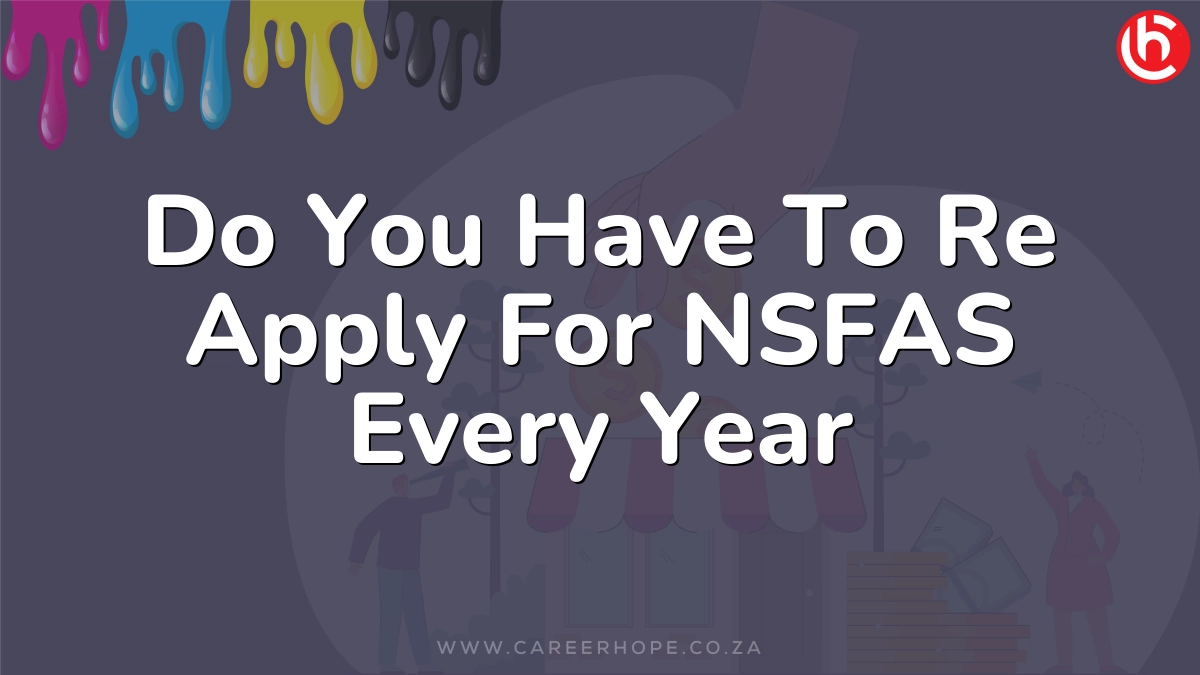No, you don’t have to re-apply for NSFAS every year. Once you are approved for funding, NSFAS funds you for the duration of your studies, provided you meet the academic progression requirements. This means that if you maintain satisfactory academic performance, your funding will continue without the need to reapply annually.
Understanding NSFAS Funding Process
The National Student Financial Aid Scheme (NSFAS) is a government-funded program designed to provide financial assistance to eligible students from disadvantaged backgrounds. It aims to ensure access to higher education for those who might otherwise be unable to afford it. NSFAS funding covers the entire academic year, including tuition fees, accommodation, meals, and other allowances.
When you apply for NSFAS funding, the application process involves submitting various documents and meeting specific criteria. Once approved, the funding is granted for the entirety of your studies, subject to certain conditions. You don’t need to reapply every semester or year unless there are significant changes to your circumstances or academic performance.
Maintaining Academic Progression
While you don’t have to reapply for NSFAS funding annually, it’s crucial to maintain satisfactory academic progress. NSFAS has specific requirements for academic performance that students must meet to continue receiving financial assistance. If you fail to meet these requirements, your funding may be discontinued or put on hold until you improve your academic standing.
Therefore, it’s essential to prioritize your studies and strive for academic excellence to ensure uninterrupted funding from NSFAS. Regular communication with your institution’s financial aid office can also help you stay informed about any changes or requirements related to your NSFAS funding.
People Also Ask
Where is the nearest centre to apply?
Visit www.nsfas.org.za to find an application centre closest to your location. The website provides a comprehensive list of NSFAS application centres across the country.
Can students with disabilities apply for funding?
Yes, students with disabilities are encouraged to apply for financial assistance from NSFAS. NSFAS provides special disability funding to all approved students with disabilities attending any of the 26 public universities or 50 TVET colleges. However, the applicant’s household income must not exceed R600,000 per year.
I have not received any funding decision for my 2023 funding application
If you haven’t received a funding decision for your 2023 application, log into your myNSFAS account and track the progress of your application. The page will advise you on the current stage of your application and provide guidance on any further steps or information required.
I only have a cellphone number and no email address; how do I proceed with the application?
To apply for NSFAS funding, you need an email address. Creating a free email account is easy and straightforward. You can create an email address through Gmail, Yahoo, Webmail, or any other free email service provider. This will ensure that you receive relevant communication from NSFAS regarding your application and funding status.
What documents are required for the NSFAS application?
The required documents for the NSFAS application typically include a completed application form, proof of household income (e.g., payslips, affidavits), academic records, and identity documents. It’s essential to submit all the necessary documents on time to avoid delays in the application process.
How is NSFAS funding awarded?
NSFAS funding is awarded based on financial need and academic merit. Students from households with an annual income below a certain threshold and meeting the academic requirements are eligible for funding. The funding covers tuition fees, accommodation, meals, and other allowances based on the institution’s cost structure.
Can NSFAS funding be used for any institution or course?
NSFAS funding is only available for study programs at public universities and TVET colleges in South Africa. It cannot be used for private institutions or courses that are not accredited by the Department of Higher Education and Training.
What happens if I drop out or change institutions?
If you drop out or change institutions during the academic year, you must inform NSFAS immediately. Failure to do so may result in the discontinuation of your funding or the requirement to repay the funds already disbursed. It’s essential to follow the proper procedures and guidelines provided by NSFAS.
Remember, NSFAS funding is a valuable opportunity for students who might otherwise be unable to access higher education. By maintaining academic excellence and adhering to the program’s requirements, you can continue receiving financial assistance throughout your studies without the need to reapply annually.

